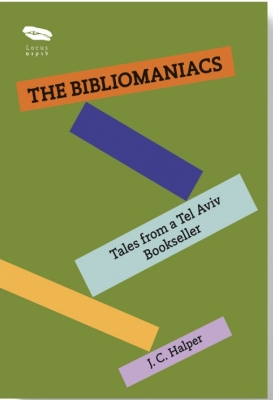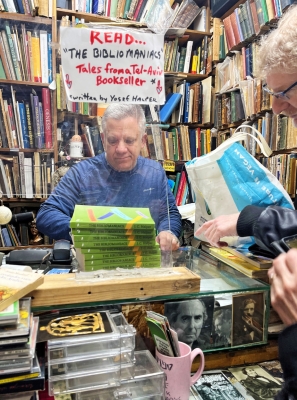The Bookstore on Allenby Street
The Bibliomaniacs | Tales of a Tel Aviv Bookseller
Author J.C. Halper.
Reviewed by Cindy Moritz
Halper's bookstore, tucked away in a curiously quaint alleyway off Allenby Street in Tel Aviv, is an experience more than it is a mere place to buy books. Of course, you will buy books. My first visit there, on a cool but bright municipal election day just months post October 7 in Israel, the shop was buzzing. "It's not usually like this", explains owner Yosef Halper, between ringing up piles of special finds and guiding new customers to their topic of interest, certainly to be found somewhere among the heaving shelves and stuffed passages. "Except on Fridays," he adds.
At the checkout desk is stacked a modest pile of green-covered paperbacks beneath a handwritten sign urging you to add one more book to your haul. It's the owner's debut, after over 30 years selling books at the same address: Bibliomaniacs, Tales from a Tel Aviv Bookseller. Author J.C. Halper.
It becomes clear after mere minutes in the space that, while the shelves are groaning with used books, his customers aren't there only to scavenge their next read. It's a "book scene" in Halper's words. And it's this scene, the characters that inhabit it and the "crazy stuff that goes on in the store", that provided more than enough material for Halper to write the interlaced stories that paint a gritty, funny, even profound picture of the life and times of this Tel Aviv bookseller.
Despite having lived in Israel for almost 40 years, Halper often feels like an outsider. Born in Newark and raised in Springfield, New Jersey, in another life he may have gone on to pursue academia, perhaps even law like many of his friends. But his life took an unpredictable turn, not dissimilar to those he crafts into the stories about the "off-color and unusual" humans who bring Halper's bookstore to life on the page.
He opened in 1991 after finding the spot on what he calls "the gritty Allenby Street in South Tel Aviv", after "forces way beyond (his) control – like the First Gulf War – had intervened to delay, stymie, and generally drive (him) nuts…". He describes in an early chapter, How I Became a Bookseller, the twists and turns that led him to start the business and keep going for decades. He's watched other bookstores in the area come and go, but somehow his is a place where everybody, eventually, knows your name.
No story captures this more than that of Julian, a flawed yet somehow endearing character whose colorful life, and mysterious death, infuse Halper's stories with a human element that intimately portrays the relationships he's had with his customers over the years. While he's classified this book as fiction, there is no doubt that most, if not all, of the stories are based in fact, with adjustments made to protect both the subjects and the writer where necessary. But Julian, he tells, was a real friend. A complex soul who Halper describes as, "not your stereotypical bibliophile, but a tough-looking and tough-talking Brit who would appear to be more at home as a doorman at an after-hours club in Soho than in a dusty Tel Aviv bookstore". He makes his entrance around the discovery of an expensive bottle of whisky, from which stemmed a Friday afternoon kiddush ritual, with herring, pickles and Scotch, that features in many of Halper's vignettes. "These kiddushes on Fridays are something reminiscent of our past lives elsewhere, perhaps," Halper muses, although the crowd has morphed into a "mixed bunch which includes native Israelis as well". He calls them less rowdy than the original crowd of Julian's days, but fun anyway.
It's not a Friday when I visit, but a rare day off for Israelis, and I've inserted myself among the bookshelves, hoping to find a slice of the unpolished charm that jumps off the pages of The Bibliomaniacs. Perhaps a character will walk in, and I'll see this for myself.
On cue, a tall, elderly, slightly stooped American-accented man enters. Warm greetings out of the way, he begins to schmooze with the bookseller. His baseball cap has a backstory, and "… did you hear, my sister died?", he asks. She was ninety-something. I catch snippets of an exchange in which I think he says he saw Halper described in an interview as a "legend", though in his opinion it would be more correct to call him a "dean", with reference to "strengthening and conditioning cultures". I imagine Halper's expression as he responds with few words. I hope he's filing away this conversation as a mental note in the category of "content for another story", among the incidents he feels should be preserved for posterity, that have, in his words, been "bouncing around in (his) noggin for years". He's not short of material.
Halper says there is a next book on its way, this one featuring some of the stories he was reluctant to include in The Bibliomaniacs. When another customer comes in, this one speaking British-accented English, he asks how that book is coming along. "Slowly", Halper replies. Perhaps it's the disruption brought on by a pandemic, perhaps by the excruciating war, not unlike the disruption that delayed the opening of his bookstore in 1991.
The customer comments on the classical music playing in the background as Halper rings up his purchases. It's a radio station, says Halper, but the customer persists, wants to know what's playing. "Shazam it," someone suggests, and soon we discover it's Mendelssohn. Perhaps it's apt that he was the grandson of the well-regarded Jewish philosopher Moses Mendelssohn. Maybe it's noteworthy that he was German, and maybe there is no relevance at all to the music being broadcast by a classical radio station unconnected to the bookstore. But here, as in the pages of the book, everything seems significant. It could be that it's the type of person who frequents a used bookstore that finds meaning in such small details.
These are the Bibliomaniacs. They're there for the books and may go to extreme measures to get their hands on them, but also not just there for the books. It's that "book scene" Halper mentioned, that keeps them coming back. It's the Humans of Tel Aviv manifest in a bookish context, a slice of immigrant (and of course other) life in Israel.
I confess I read the last words of The Bibliomaniacs with a tear in my eye. This was unexpected. While Halper takes you on a charged journey through Tel Aviv via his colorful characters, it also feels like he's invited his readers into a circle of valued, though not always dear, friends.
If a good read leaves you hanging for more, this is a case in point. You won't want to lose touch with these Bibliomaniacs. Fortunately, bar a series of unexpected events, we will be reacquainted soon. And of course, the bookstore carries on through it all, having become its own story after all these years.










Comments